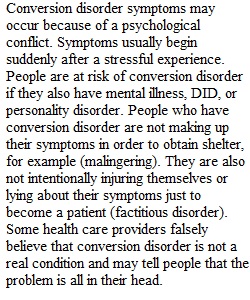


Q People with somatoform disorders complain of physical problems such as paralysis, pain, or a persistent belief that they have a serious disease. Yet no evidence of a physical abnormality can be found. Illness Anxiety Disorder Conversion Disorder View this short clip from the HBO Band of Brothers Episode, (turn your sound up) where Private Albert Blithe suffers from what was then known as Hysterical Blindness, a type of Conversion Disorder. Read the article Conversion Disorder (Links to an external site.) on MedlinePlus. There is a great deal of controversy surrounding conversion disorder. There is evidence that people with conversion disorder are susceptible to being hypnotized (Ejareh dar & Kanaan, 2016), and some investigators consider conversion disorder to be a form of self-hypnosis in which people focus so intently on an imaginary physical problem that they exclude conflicting information (Roelofs et al., 2002). Research evidence suggests that people who develop illness anxiety disorder are particularly sensitive to bodily sensations and tend to ruminate about them (Marcus et al., 2008). In a reply of 250-300 words, give your thoughts on this disorder. Is it real? respond to at least two other students in 75-100 words. Note: Click the options button in the upper right corner to see the rubric for this exercise.
View Related Questions